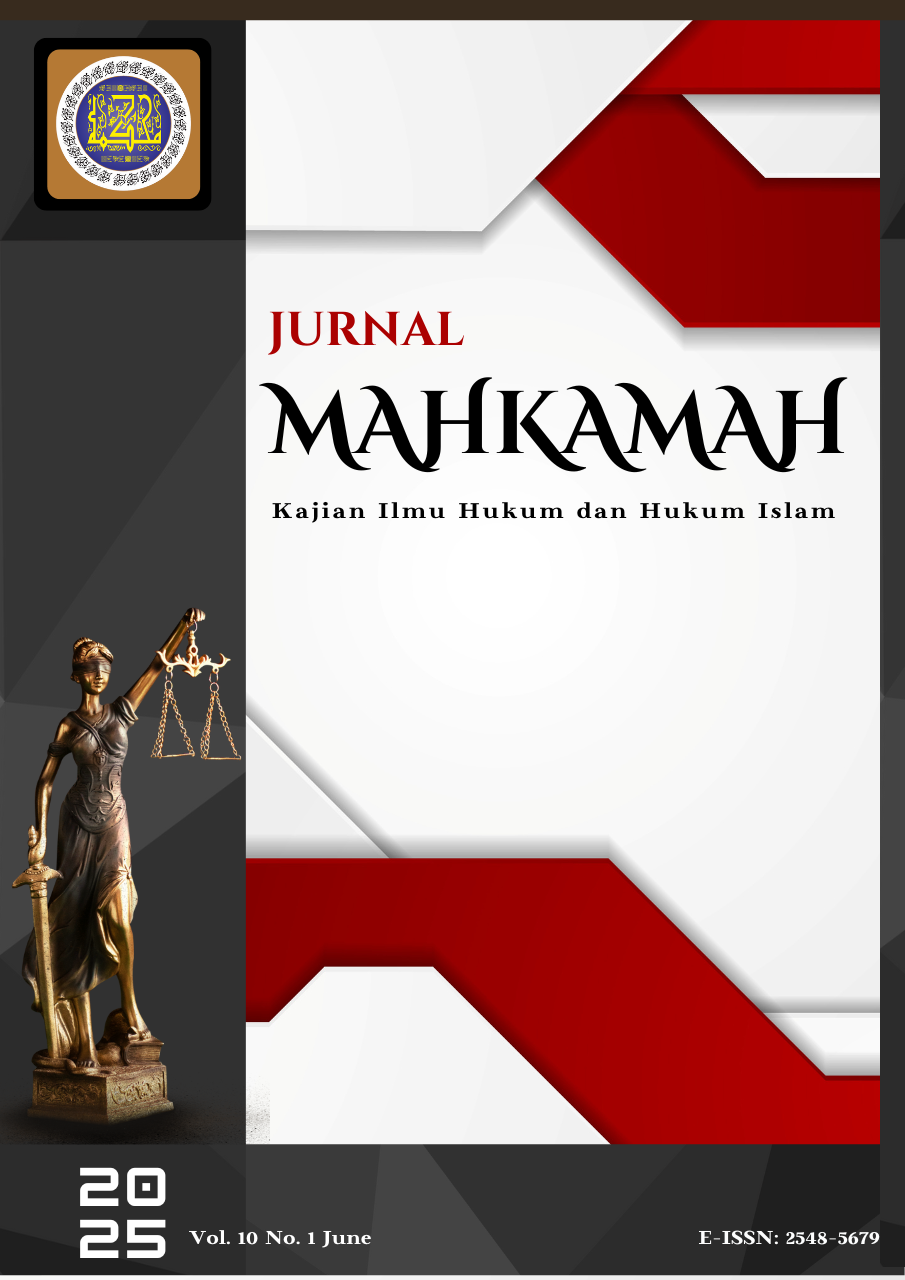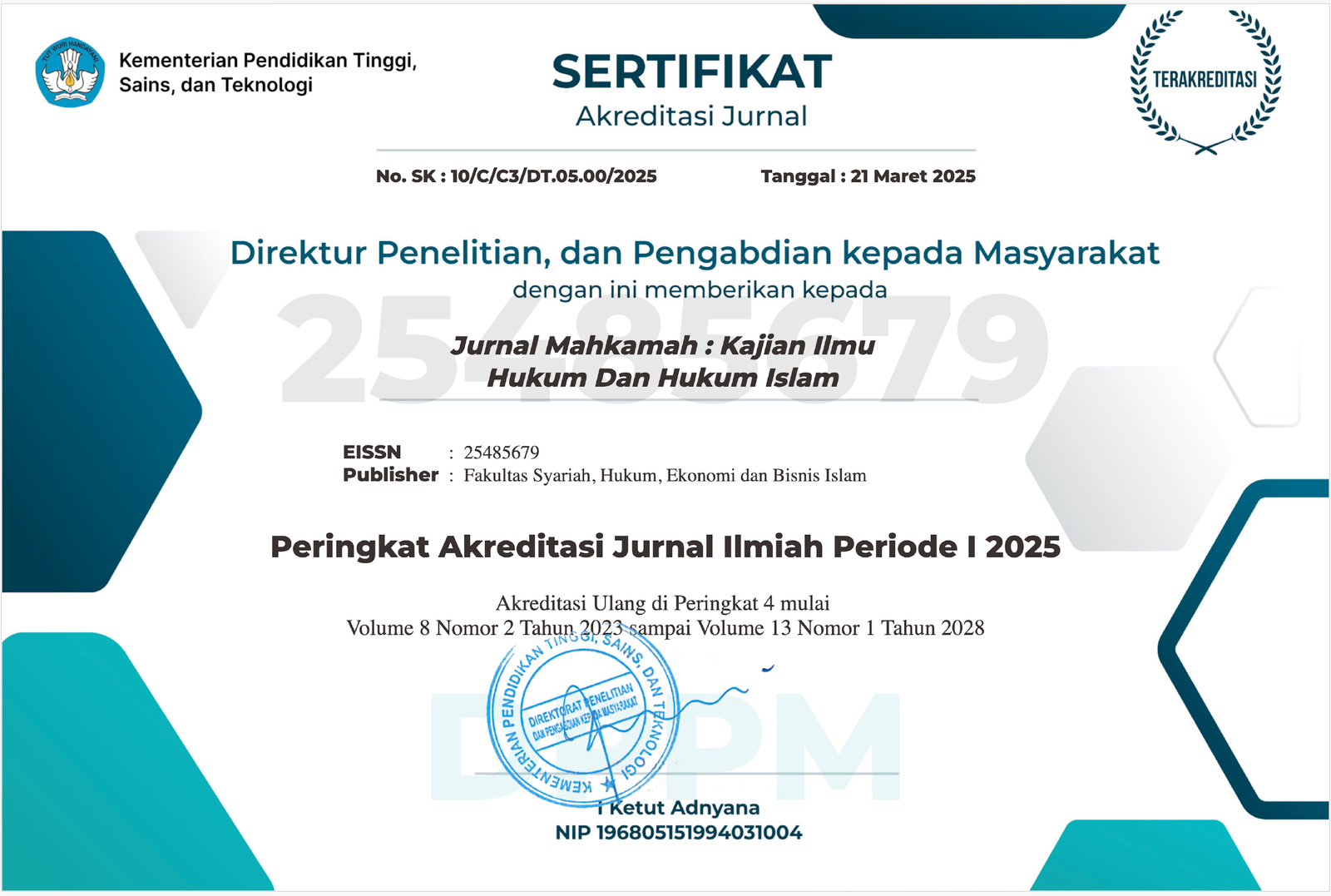Protection of Children's Rights in Post-Divorce Custody Disputes Comprehensive Study on the Best Interests of Children
DOI:
https://doi.org/10.25217/jm.v10i1.6219Keywords:
Best Interests of the Child, Child Custody, Post DivorceAbstract
In the framework of Indonesian positive law, it is only the KHI that assigns child custody to the mother. Other legal provisions merely indicate that both parents are responsible for their children's care without clarifying which parent is awarded custody following a divorce. Various rulings exist that have granted custody to mothers, yet there are also instances where custody has been awarded to fathers. This creates ambiguity regarding the determination of child custody post-divorce. The objective of this study is to assess the most effective indicators for judges to consider in making child custody decisions, grounded in the principle of prioritizing the child's best interests. The methodology employed for this research is prescriptive normative legal analysis with a conceptual focus. Findings indicate that several factors can be utilized when deliberating on custody matters, including the child's wellbeing, the behavior of the parents, cooperation between them, and the allocation of parenting time. Should there be a need for additional factors, judges are permitted to incorporate these, provided they align with the principle of the child's best interests.
References
Abdurahman. (1990). Islamic Marriage Law in Indonesia . Bulan Bintang.
Ahmad, FR, Asfiyak, K., & Kaha, H. (2024). Legal Protection of Children's Rights Due to Divorce According to the Compilation of Islamic Law. Hikmatina Journal , 6 (2), 147–156. https://jim.unisma.ac.id/index.php/jh/article/view/25062
ASyahan Nur Muhammad H, ASCNSNMH (2024). Determination of Child Custody Rights After Divorce Based on the Principle of the Best Interests of the Child. Journal of Law, Education and Social Humanities , 1 , 151–161. https://doi.org/https://doi.org/10.62383/aliansi.v1i2.84
Aulia, MF (2022). Comparative Analysis of the Implementation of Family Law in Egypt and Indonesia. Al-Ahwal Al-Syakhsiyyah: Journal of Family Law and Islamic Courts , 2 (2), 123–132. https://doi.org/10.15575/as.v2i2.14327
Cristine, K. and. (2008). Civil Law Module. Author: Prof. Drs. CST. Kansil, SH. & Cristine ST. Kansil, SH (Revision). PT. Pradnya Paramita. https://jdih.baliprov.go.id/produk-hukum/monografi-hukum/buku-hukum/27114
Dian Yudhantara Syahputra, & Syaifuddin Zuhdi. (24 CE). Comparison of the Legal Construction of Hadhanah Rights in Saudi Arabia, Turkey and Indonesia. Court: Journal of Legal Studies & Islamic Law , 9 , 131–148. https://doi.org/https://doi.org/10.25217/jm.v9i1.4753
Drs. Muntasir, MH . (2023). Gender Sensitivity of Judges in Child Custody Decisions (Hadhanah). Directorate General of Religious Courts . https://badilag.mahkamahagung.go.id/artikel/publikasi/artikel/sensitifitas-gender-hakim-dalam-putusan-hak-asuh-anak-hadhanah-oleh-drs-muntasir-mhp-16-11
Elrod, LDH, & Dale, MD (nd). Paradigm Shifts and Pendulum Swings in Child Custody: The Interests of Children in the Balance . Retrieved May 1, 2025, from https://papers.ssrn.com/abstract=1354776
Hikmatullah. (2 CE). FIQH MUNAKAHAT Marriage in Islam . EDU Library. https://digilib.alfithrah.ac.id/index.php?p=show_detail&id=4003
Islami, I., & Sahara, A. (2019). Legality of Custody Rights of Minors (Hadhanah) to Fathers After Divorce. ADIL: Journal of Law , 10 (1). https://doi.org/10.33476/AJL.V10I1.1070
John Bowlby. (1982). Attachments: Second Edition. In basic books (p. 464).
Law, G. (nd). Joint Custody of the Child Explained . Retrieved June 30, 2025, from https://www.gjclaw.com.sg/articles/joint-custody-of-the-child-explained/
Linda Firdawaty, Siti Mahmudah, & Rozana Isa. (23 CE). The Implementation of Dwangsom in the Execution of Hadhanah Matters and its Relationship to the Ultra Petita Basis. Court: Journal of Legal Studies & Islamic Law , 8 , 203–214. https://doi.org/https://doi.org/10.25217/jm.v8i2.3648
Lyne Ranson. (2025). Child Custody Types: Pros, Cons, Examples, & Resources . https://www.ourfamilywizard.com/blog/child-custody-types-pros-cons-examples-resources
Mansari. (2016). Judge's Consideration of Giving Child Custody to Father. PETITA: Journal of Law and Sharia Studies , 1 (1). https://doi.org/10.22373/PETITA.V1I1.80
MdSalleh, A., Halim Mohd Noor, A., Bahrom, H., Rahim Ridzuan, A., Irfan, H., Ab Rahman, A., Mahad Musa, Z., Martiah Anwar, S., Murtiyani, S., Condro Triono, D., Sasono, H., Zahra, H., Sri Muhammad Ali Hashim, T., & Murtazam Conflict Management in the Body of the Muslim Community According to the Quran, T. (2020). Analysis and Evaluation of the Implementation of Public Ownership and State Ownership Management in Indonesia (with the Hamfara School Approach). Media Syari'ah: A Vehicle for the Study of Islamic Law and Social Institutions , 17 (1), 143–170. https://jurnal.ar-raniry.ac.id/index.php/medsyar/article/view/1931
Muhammad Abil Anam, & Yushinta Eka Farida. (2023). Childcare after Divorce in the Perspective of Islamic Family Law. Cahaya Mandalika , 4 , 1649–1656. https://doi.org/https://doi.org/10.36312/jcm.v4i3.2428
Muhammad Hifni. (2016). Child Custody Rights After Divorce Between Husband and Wife in the Perspective of Islamic Law. Journal of Islamic Family Law) , 1 (2). https://doi.org/10.32678/BILDALIL.V1I02.123
Muhammad Husni Abdulah Pakarti, DFFAKM (2023). Protection of Children's Rights in Divorce According to Islamic Family Law. Usroh: Journal of Islamic Family Law , 7 , 15–36. https://jurnal.radenfatah.ac.id/index.php/usroh/article/view/18902/6473
Muhammad Rais. (2016). The Position of Adopted Children in the Perspective of Islamic Law, Customary Law and Civil Law. Jurnal Hukum Diktum , 14 , 183–200. https://ejurnal.iainpare.ac.id/index.php/diktum/article/view/232/156
Pakarti, MHA, Farid, D., Utama, SM, Syuhada, O., & Hendriana, H. (2023). The Principle of Justice as One of the Basis for Judges in Deciding on Divorce Decisions. Al-Ahwal Al-Syakhsiyyah: Journal of Family Law and Islamic Courts , 4 (2), 101–116. https://doi.org/10.15575/AS.V4I2.25998
Sari, Y.D. (2011). Custody of minor children resulting from divorce according to law no. 23 of 2002 concerning child protection: (analysis of supreme court case decision no. 349 K/AG/2006) . https://repository.uinjkt.ac.id/dspace/handle/123456789/2272
Sulastri, Khairani, & Siti Sholehah Alfi Mulhama. (24 CE). Strategies for Preventing Sexual Violence against Children Based on Islamic Law in Lampung Province. MK: Journal of Islamic Science & Law Studies , 9 , 253–270. https://doi.org/https://doi.org/10.25217/jm.v9i2.5084
Syafiuddin, MN (2022). Accentuation of the Best Interests of Children in Support Decisions as an Effort to Guarantee Children's Human Rights. Jurnal HAM , 13 (2), 235. https://doi.org/10.30641/HAM.2022.13.235-252
Tarmizi, Yulia Pradiba, & Karmila Usman. (2023). The Appearance of Child Custody Rights (Hadhanah) After Divorce and Its Legal Consequences. Legal Science of Custody , 1 (1), 13–21. https://journal.uniasman.ac.id/index.php/JIHP/article/view/38/35
Zainuddin Ali. (2009). Legal Research Methods . Sinar Grafika. https://books.google.co.id/books?id=y_QrEAAAQBAJ&printsec=frontcover&hl=id#v=onepage&q&f=false
Downloads
Published
How to Cite
Issue
Section
License
Copyright (c) 2025 Ahmad Khotim

This work is licensed under a Creative Commons Attribution-ShareAlike 4.0 International License.
This work is licensed under a Creative Commons Attribution-ShareAlike 4.0 International License.
Authors retain copyright and grant the Jurnal Mahkamah : Kajian Ilmu Hukum Dan Hukum Islam right of first publication with the work simultaneously licensed under a Creative Commons Attribution License (CC BY-SA 4.0) that allows others to share (copy and redistribute the material in any medium or format) and adapt (remix, transform, and build upon the material) the work for any purpose, even commercially with an acknowledgment of the work's authorship and initial publication in Jurnal Mahkamah : Kajian Ilmu Hukum Dan Hukum Islam.
Authors are able to enter into separate, additional contractual arrangements for the non-exclusive distribution of the journal's published version of the work (e.g., post it to an institutional repository or publish it in a book), with an acknowledgment of its initial publication in Jurnal Mahkamah : Kajian Ilmu Hukum Dan Hukum Islam.
Authors are permitted and encouraged to post their work online (e.g., in institutional repositories or on their website) prior to and during the submission process, as it can lead to productive exchanges, as well as earlier and greater citation of published work (See The Effect of Open Access).









